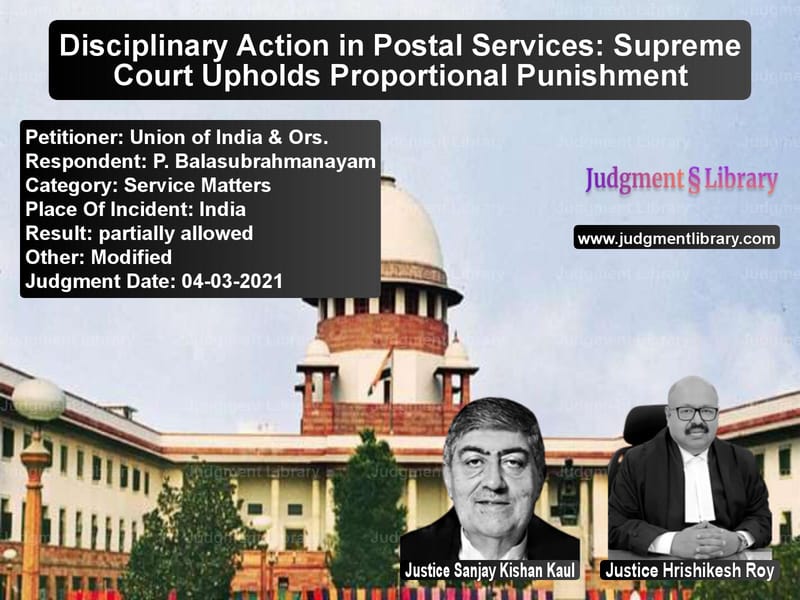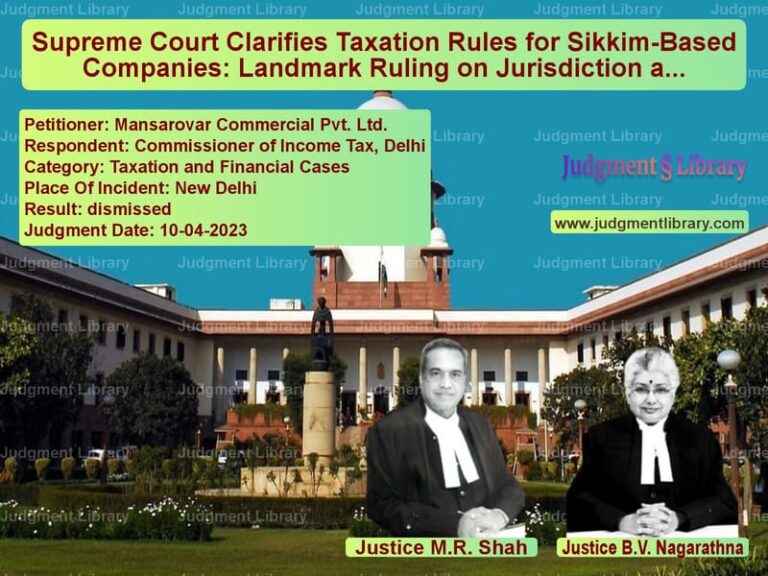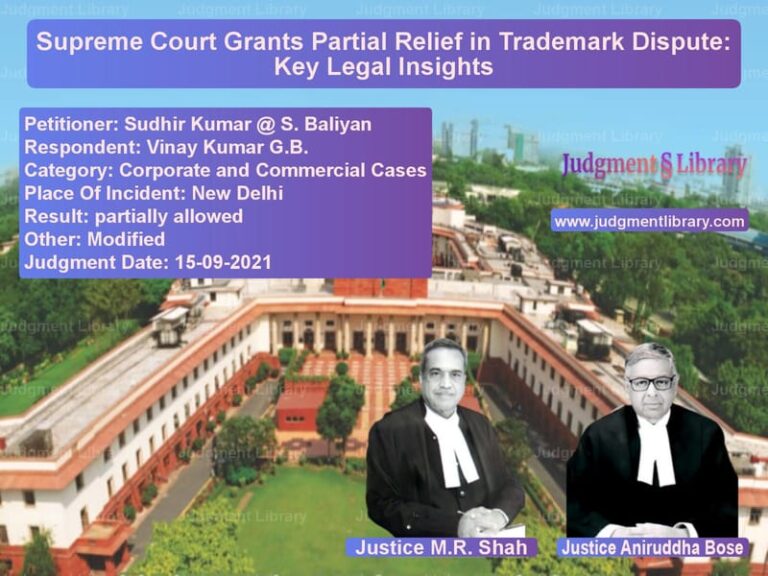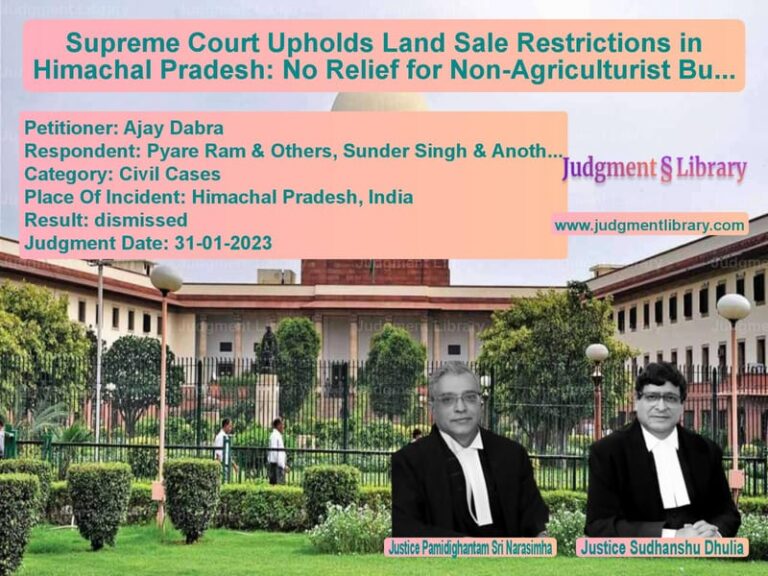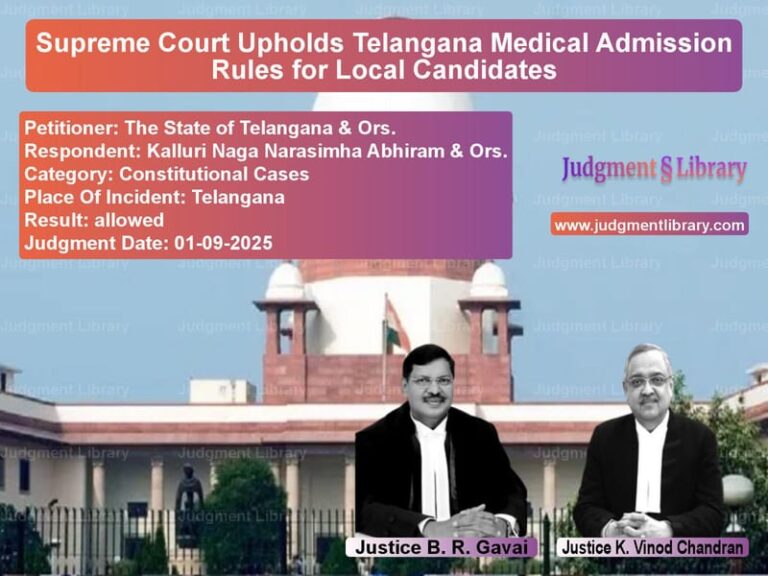Disciplinary Action in Postal Services: Supreme Court Upholds Proportional Punishment
The case of Union of India & Ors. vs. P. Balasubrahmanayam revolves around a disciplinary proceeding against a postal service employee and the validity of the punishment imposed. The Supreme Court examined whether the requirement of obtaining prior approval from the Central Vigilance Officer (CVO) was mandatory and whether the punishment of compulsory retirement was disproportionate to the charges proved against the employee.
Background of the Case
The respondent, P. Balasubrahmanayam, joined the Department of Posts as a Postal Assistant in 1991 and was promoted to Assistant Superintendent of Posts in 2008. A charge memo dated April 13, 2010, was issued against him under Rule 14 of the Central Civil Services (Classification, Control, and Appeal) Rules, 1965. The charges included procedural lapses in the discharge of his duties and allegations of bribery.
The respondent challenged the charge memo before the Central Administrative Tribunal (CAT) on the ground that prior approval from the CVO was not obtained before issuing the memo, as required by a 2005 circular of the Department of Posts. The Tribunal dismissed his challenge, holding that the requirement of prior CVO approval was not mandatory.
After an inquiry, the disciplinary authority found that the bribery charges were not proved, but procedural lapses were established. The respondent was awarded the punishment of compulsory retirement. He challenged the order before the High Court, which set aside the punishment and directed his reinstatement with all consequential benefits.
Key Issues Before the Supreme Court
The Supreme Court considered the following questions:
- Whether prior approval from the CVO was mandatory before initiating disciplinary proceedings.
- Whether the punishment of compulsory retirement was disproportionate to the charges proved.
- Whether the High Court was justified in setting aside the punishment and directing reinstatement.
Arguments by the Petitioners (Union of India & Ors.)
- The requirement of obtaining prior CVO approval was procedural and not mandatory.
- The charges of procedural lapses against the respondent were serious and warranted a major penalty.
- The High Court exceeded its jurisdiction by interfering with the disciplinary authority’s decision and ordering reinstatement.
- Administrative rules and circulars do not override statutory rules unless they are expressly stated to have statutory force.
Arguments by the Respondent (P. Balasubrahmanayam)
- The disciplinary proceedings were vitiated because prior approval from the CVO was not obtained, as mandated by the 2005 circular.
- The punishment of compulsory retirement was excessive and disproportionate to the charges proved.
- The High Court correctly intervened to prevent injustice and ensured compliance with procedural safeguards.
- The disciplinary authority acted arbitrarily by imposing an unduly harsh penalty despite the bribery charges not being proved.
Supreme Court’s Analysis
1. Mandatory Nature of CVO Approval
The Supreme Court ruled that obtaining prior CVO approval before initiating disciplinary proceedings was not mandatory. The Court observed:
- “The circular of 2005 was intended as a safeguard to prevent unjustified initiation of disciplinary proceedings but did not override statutory rules.”
- “Where allegations of bribery are not proved, the lack of prior CVO approval does not vitiate the proceedings.”
2. Proportionality of Punishment
The Supreme Court agreed with the Tribunal’s view that the punishment of compulsory retirement was disproportionate to the charges proved. It observed:
- “The charges found proved against the respondent related to procedural lapses and not corruption or bribery.”
- “A lesser penalty would have been more appropriate given the nature of the misconduct.”
3. High Court’s Direction for Reinstatement
The Supreme Court held that the High Court erred in setting aside the disciplinary proceedings entirely and ordering reinstatement. The Court ruled:
- “The High Court should have confined itself to modifying the punishment instead of quashing the entire proceedings.”
- “Judicial interference in disciplinary matters should be limited to cases of gross procedural irregularities or disproportionate punishment.”
Final Judgment
The Supreme Court modified the punishment imposed on the respondent. The key findings were:
- The requirement of prior CVO approval was not mandatory.
- The punishment of compulsory retirement was disproportionate and should be reduced to a minor penalty.
- The respondent’s misconduct did not warrant dismissal or compulsory retirement.
- The High Court’s order reinstating the respondent was set aside.
- The disciplinary authority was directed to impose an appropriate minor penalty.
Implications of the Judgment
This ruling has significant implications for disciplinary proceedings in government services:
- It clarifies that procedural safeguards such as CVO approval do not override statutory rules.
- It reaffirms that courts should not interfere in disciplinary matters except in cases of gross injustice.
- It establishes the principle that punishment must be proportionate to the misconduct proved.
- It provides guidance on balancing procedural fairness with the need for effective disciplinary action in government employment.
By modifying the punishment while upholding the validity of the disciplinary proceedings, the Supreme Court struck a balance between administrative efficiency and the principles of fairness and proportionality in service jurisprudence.
Petitioner Name: Union of India & Ors..Respondent Name: P. Balasubrahmanayam.Judgment By: Justice Sanjay Kishan Kaul, Justice Hrishikesh Roy.Place Of Incident: India.Judgment Date: 04-03-2021.
Don’t miss out on the full details! Download the complete judgment in PDF format below and gain valuable insights instantly!
Download Judgment: union-of-india-&-ors-vs-p.-balasubrahmanayam-supreme-court-of-india-judgment-dated-04-03-2021.pdf
Directly Download Judgment: Directly download this Judgment
See all petitions in Disciplinary Proceedings
See all petitions in Public Sector Employees
See all petitions in Employment Disputes
See all petitions in Judgment by Sanjay Kishan Kaul
See all petitions in Judgment by Hrishikesh Roy
See all petitions in partially allowed
See all petitions in Modified
See all petitions in supreme court of India judgments March 2021
See all petitions in 2021 judgments
See all posts in Service Matters Category
See all allowed petitions in Service Matters Category
See all Dismissed petitions in Service Matters Category
See all partially allowed petitions in Service Matters Category

